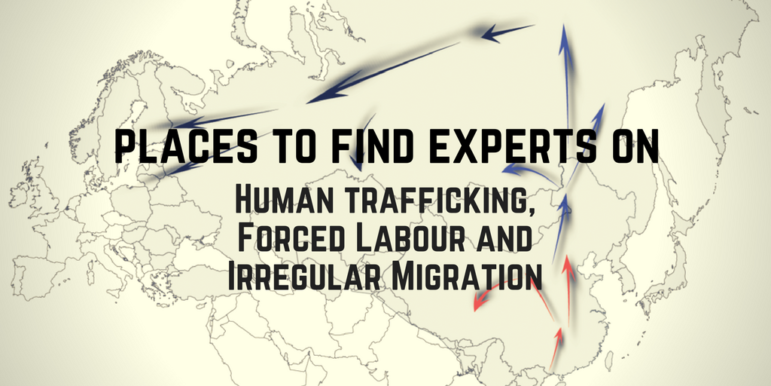
Full guide here. العربية
Experts on forced labor, human trafficking and irregular migrant labor often focus on a specific country or specific migration corridor in the Middle East and North Africa (MENA) region. It is strongly recommended to seek experts from both origin and destination countries as they can provide different insights into the various phases of the migration process.
International Labour Organization
Organization reports cover a range of topics related to trafficking and forced labor, and their authors can be contacted for further commentary. The ILO’s regional headquarters are based in Beirut and its current projects include the Regional Fair Migration Project in the Middle East. Their officers are useful points of contact, and can put you in touch with researchers, activists and government officers.
International Organisation on Migration
The IOM has local offices in some destination countries, and sometimes intervenes to facilitate the repatriation of trafficked migrants. In addition to officials at these offices, authors of their various publications are also a useful resource.
- IOM Kuwait: Gulf Cooperative Council regional headquarters.
- IOM Yemen
- IOM Jordan
- IOM Lebanon
Other Organizations
We’ve curated a list of organizations operating in the MENA migration corridors here.
Academics
Labor migration is well-studied in many origin and destination countries. Local academics are likely to have case studies and insights gleaned from many years of studying migration and trafficking practices in their communities. Examples include:
- Dr Shaiban Taqa, author of “The Legal Framework of Migrant Worker Rights in the Arab Countries.”
- Dr Bina Fernandez, author of “Migrant Domestic Workers in the Middle East: The Home and the World,” “Irregular Migration from Ethiopia to the Gulf States” and “Traffickers, Brokers, Employment Agents and Social Networks: The Regulation of Intermediaries in the Migration of Ethiopian Domestic Workers to the Middle East.”
- Rooja Bajracharya and Bandita Sijapati, authors of “The Kafala System and Its Implications for Nepali Domestic Workers.”
- The Egyptian Society for Migration Societies.
- Dr Ray Jureidini. Dr Ray Jureidini is one of the leading experts on migration in the MENA region, and kicked off the study of migrant domestic workers in Lebanon. He continues to publish regularly on migrant worker issues across the MENA region.
- Studies by Dr Nasra Shah. Dr Nasra Shah is a Kuwait-based population studies specialist who has published several studies on migration and trafficking in the GCC.
Origin Countries
Labor Attaches
Labor attaches can provide information on the issues specific to their workers in a particular country. They are alert to the common problems facing workers and the obstacles to resolving them.
Embassy Social Workers
Some embassies employ social workers for their communities’ welfare or assign them to specific cases involving their citizens. They have a wealth of information on victims of trafficking and forced labor and may be able to put you in touch with workers directly.
You can reach both labor attaches and social workers by contacting embassies of countries of origin. Embassy contact information can be easily found online. Note that in-person meetings will be more productive, as responsiveness via mail or phone is not always reliable.
Migrant Civil Society Organizations
Grassroots organizations often have a wealth of information on migrants which is not published online. Look for migrant advocates at both the national and local level, as they have different stories and experiences to share. Examples include:
- Nepal: Center for Migration and International Relations
- Pan-African Network in Defense of Migrants’ Rights
- Migrant Forum in Asia
Destination Countries
Migrant Civil Society Organizations
Local organizations may focus broadly on human rights or specifically on migrant rights, but in either case often have insight into trafficking hotspots as well as how the legal/social system treats these issues, and often have direct experience. The Arab Network for Migrant Rights no longer has a web presence, but you can contact members of the network through Tamkeen-Jo.org.
Migrant Networks and Communities
These networks range from officially registered community organizations like social clubs to loose networks which aid compatriots in distress. Officially registered communities are easier to locate; many large origin countries have branches around the world. The looser networks are more difficult to access, but friendly embassy officials may be able to connect you. Examples of registered communities include:
- India Club Dubai
- Migrante International. Several branches of overseas Filipino workers across the region.
- Indian Social Club Muscat
- Bengali Social Club Kuwait
